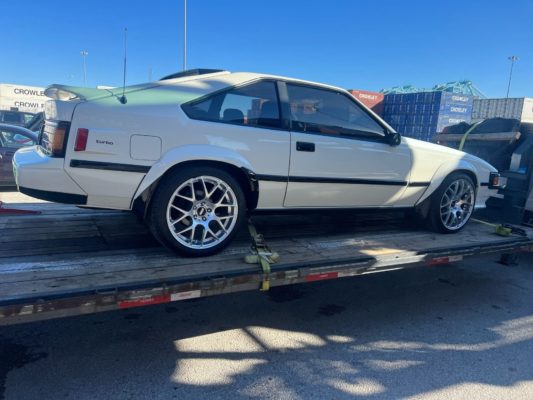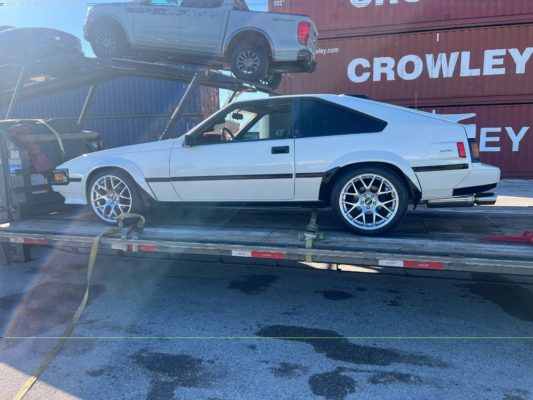Frequently Asked Questions when shipping a car to hawaii
When it comes to shipping a car to Hawaii to or from Hawaii?
- To Hawaii from U.S. Mainland 19-33 Days+
- To U.S. Mainland from Hawaii 9-24 Days+
†Includes 5-8 sailing days, 3-5 days loading/unloading, 4-14 days for neighbor island barge sailing. Transit times will vary based on vessel and connecting barge schedules and loading/unloading time. Vehicle availability may vary; contact Customer Service for details.
MILITARY discounts when shipping a car to Hawaii
With gratitude, we offer a $100 military discount to active duty service members for each car shipment either from Hawaii to U.S. Mainland or from U.S. Mainland to Hawaii.
You may also be interesting on shipping a car to Puerto Rico


Vehicle Requirements when shipping a car to Hawaii
- Vehicles must be in operating condition, with a working emergency brake, when tendered for shipment.
- Vehicles with a warning light to check engine, airbags, or tires will be refused for safety reasons.
- Vehicles must either be licensed or qualified to be licensed for operation on public streets or highways.
- Windshields and windows must be free of cracks and other damage.
- Vehicles must have 6-inch minimum ground clearance.
- Wash your vehicle.
- Remove all personal belongings from your vehicle*. Car covers, roof cargo carriers, attached tents, bike racks, and additional batteries of any kind must be removed from the vehicle.
- Remove any ignition interlock devices (in-car breathalyzer, car interlock, blow and go) from the vehicle. The port will not accept any vehicles with ignition interlock devices installed.
- Reduce fuel to a level between 1/8 and 1/4 of the tank, but not exceeding 1/4 of the tank. For electric vehicles, batteries should have a charge between 45% and 65% or they may be refused.
- Remove all fire extinguishers from your vehicle.
- Empty all auxiliary propane tanks if your vehicle carries any.
- For electric vehicles only, the state of charge should be between 45% and 65%. All charging cable(s)/adaptor(s) specific to the electric vehicle brand and model type should be left in the vehicle.
- It is recommended that all remote monitoring devices not be used while the vehicle is in port’s possession. The port will not accept any liability for charging electronic vehicles, dead batteries, or any functions controlled by a remote monitoring device. All electric vehicles and their accessories are shipped at their own risk.
- * An Electric Vehicle Surcharge will be applied to fully electric vehicles powered solely by lithium-ion batteries.

Pressure wash your vehicle before dropping it off at the port.
All vehicles must have a clean exterior so that a vehicle survey may be conducted at the load port. Dirty vehicles will not be accepted.
Please Note: Vehicles are subject to stringent inspections by the USDA. It is the responsibility of the shipper to have the interior and exterior of the vehicle thoroughly cleaned. Example: The USDA looks for clumps of mud in wheel wells or under the vehicle’s carriage, under the hood of vehicles is also inspected, the USDA also looks for dirt, grass, plant seeds in the interior as well as the exterior and for anything that they consider invasive. If your vehicle fails a USDA inspection at origin, the port will be unable to ship your vehicle until the vehicle has been properly cleaned at your expense and re-inspected by the USDA. If your vehicle fails a USDA inspection at destination, the port will be unable to release your vehicle to you until the vehicle has been properly cleaned at your expense and re-inspected by the USDA.
The USDA inspection does not apply to vehicles moving to or from the Tacoma port, however vehicles must be clean as they are still subjected to a survey at the origin port.
Remove All Personal Belongings
You may leave up to two child car seats in the vehicle. If you have an electric car, please leave the charging cable inside the vehicle.
The only other items acceptable for shipment in your automobile are accessories attached by the manufacturer to the vehicle or permanently installed in the dash, doors, rear deck, or console. For example, the following items should be removed:
All personal items:
- Loose radios
- Tape players and tapes
- Compact disc players and discs
- Portable telephones of any type
- Power boosters
- Equalizers
- Radar scanners
- Extra speakers or amplifiers
- Decorative ornaments
- Auto protective covers/auto bras
- Truck tailgate nets
- Auto roof racks if not factory installed
- Attached tents
- Bike racks
- Theft alarm systems (if you choose to leave the car alarm in your vehicle, please make sure that the system is disengaged prior to shipment)
- Toll tags
- Additional batteries of any kind
Fuel Level, Fire Extinguishers, and Propane Tanks
Fuel Level
The vehicle’s gasoline or fuel level must be between 1/8 and 1/4 of the tank, but not exceeding 1/4 of the tank.
For electric vehicles, battery charge levels should be between 45% and 65%. Electric vehicles that don’t have this charge level may be refused at drop-off.
Fire Extinguishers
Must be removed. Federal regulations do not permit fire extinguishers to be shipped with your automobile.
Propane tanks
Vehicles with propane tanks for auxiliary uses must be delivered for shipment with the propane tanks empty of any liquid or fumes.
The empty tank must be tagged and certified as “gas free” by an authorized propane dealer or service company. We recommend that you verify the cost of emptying and certifying propane tanks. It may be less costly to purchase a new tank at your destination.
Dropping Off Your Car in Hawaii or California Ports
Delivery to a Port Facility
NOTE: An auto shipment booking is required prior to delivery of your vehicle to the port.
Take your vehicle to the Port Facility. We recommend arriving at least 30 minutes prior to closing.
At the port facility you must provide the following:
- Driver’s license
- Booking number
At the Port Facility please leave a set of keys for the ignition, trunk, gas tank, and any other locking compartment. If you have an electric car, please leave the charging cable in the vehicle.
Please Note: The Department of Agriculture inspects all compartments of your vehicle. All compartments must remain unlocked and accessible for inspection. Failure to do this may result in delay in the movement of your vehicle. Your keys will accompany your vehicle to its port of discharge.
